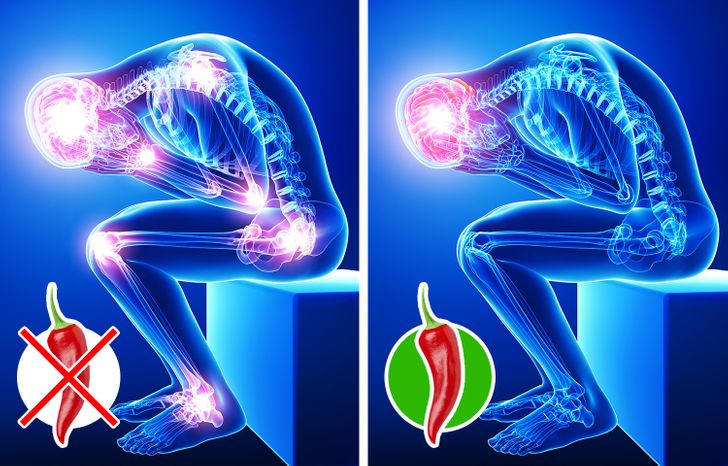Spicy food isn’t just a culinary trend—it’s a way of life for millions around the globe. From adding zest to everyday meals to offering potential health benefits, the effects of spicy cuisine are as diverse as they are fascinating. In this comprehensive guide, we explore the intricate ways spicy food impacts your body. We’ll delve into how it can boost your pain tolerance, strengthen your immune system, reduce sugar cravings, alter your taste perception, trigger allergic reactions, worsen stomach issues, and even increase heartburn.
What Happens to Your Body When You Eat Spicy Food
Enhanced Pain Tolerance: How Spicy Food Increases Your Endurance

One of the most intriguing effects of eating spicy food is its ability to elevate your pain threshold. This might seem counterintuitive—after all, the burning sensation from chili peppers is undeniably intense. However, research suggests that regular exposure to capsaicin, the active component in chili peppers, can desensitize nerve receptors over time.
When capsaicin binds to the TRPV1 receptors in your mouth and digestive tract, it initially sends a signal of pain. With consistent exposure, your body adapts by reducing receptor sensitivity, effectively increasing your tolerance for pain. This phenomenon is not only interesting from a biological perspective but may also offer practical benefits for athletes and individuals dealing with chronic pain. Studies published on Healthline explain that capsaicin’s pain-modulating properties might even contribute to enhanced performance and recovery.
Furthermore, the endorphin release triggered by capsaicin consumption can lead to a natural “high,” promoting an overall sense of well-being. This interplay between pain and pleasure is a key reason why many people develop a preference for spicy foods over time.
Boosted Immune System: The Healing Power of Capsaicin and Other Spices

Spicy food can be a potent ally in your quest for a robust immune system. Capsaicin, along with other bioactive compounds found in spices like turmeric, ginger, and garlic, has been shown to possess anti-inflammatory and antioxidant properties. These properties help combat free radicals and reduce inflammation, which is a cornerstone of a healthy immune response.
Research from the Mayo Clinic supports the idea that a diet rich in spices can enhance the body’s natural defense mechanisms. When you consume spicy food, the increase in body temperature can stimulate circulation, promoting the rapid movement of immune cells throughout your body. This enhanced circulation can help your immune system respond more effectively to pathogens.
Additionally, certain spices have antimicrobial properties that can aid in preventing infections. Incorporating spices into your diet not only adds flavor but also contributes to your overall health by supporting immune function and reducing the risk of chronic diseases.
Reduced Sugar Consumption: How Spicy Food Influences Your Cravings

If you’re trying to cut back on sugar, spicy food might be a surprising ally. Several studies indicate that the consumption of spicy foods can help regulate appetite and reduce sugar cravings. The underlying mechanism involves capsaicin’s ability to influence hormones related to hunger and satiety.
When you eat spicy food, your body experiences a temporary boost in metabolism, which can lead to a quicker feeling of fullness. This metabolic boost may help curb the desire for sugary snacks and desserts. Moreover, spicy flavors can trigger the release of hormones like adrenaline, which suppress appetite and may reduce overall calorie intake.
Incorporating spicy ingredients into your meals could be a natural strategy to manage weight and support a balanced diet. According to articles on WebMD, the thermogenic effect of spicy food can aid in calorie burning, further supporting efforts to reduce sugar consumption and manage weight.
Impact on Taste Buds: Temporary Sensory Overload or Lasting Changes?

While spicy food has many benefits, it can also have a temporary impact on your taste buds. The intense heat from chili peppers can cause a temporary numbness or altered sensitivity in your taste receptors. This phenomenon occurs as the body’s protective response to the burning sensation caused by capsaicin.
For regular consumers of spicy food, this effect is usually transient, with taste buds returning to normal after a short period. However, excessive consumption might lead to a reduced sensitivity to flavors over time, meaning that you may need stronger flavors to achieve the same level of taste satisfaction. This can lead to a vicious cycle where you crave even spicier foods to overcome this temporary desensitization.
Despite these potential drawbacks, many people enjoy the robust flavors and heightened sensory experiences provided by spicy foods. For a balanced diet, it’s essential to moderate your intake to ensure that your taste buds remain responsive to a wide variety of flavors.
Potential Allergic Reactions: When Spicy Food May Trigger Sensitivity

While the majority of individuals can safely enjoy spicy foods, some may experience allergic reactions or sensitivities. Spices like chili peppers can sometimes trigger symptoms such as skin rashes, itching, or even respiratory issues in sensitive individuals. These reactions are typically due to an intolerance or allergy to certain compounds present in spices.
For those who suspect they might be allergic, it is crucial to seek advice from a healthcare provider. An allergist can conduct tests to determine if your symptoms are indeed linked to spicy foods or if another ingredient is responsible. The American College of Allergy, Asthma & Immunology provides extensive resources and guidance on managing food allergies, including those related to spicy ingredients.
It’s important to remember that an allergic reaction to spicy food is relatively uncommon. However, if you experience severe symptoms such as difficulty breathing or swelling, it’s imperative to seek medical attention immediately.
Exacerbation of Stomach Issues: Understanding Gastrointestinal Responses to Spicy Food

For some people, spicy food can irritate the stomach lining and exacerbate pre-existing gastrointestinal conditions. Capsaicin is known to stimulate the production of gastric acid, which can lead to discomfort for individuals with sensitive stomachs or conditions like gastritis or irritable bowel syndrome (IBS).
According to research shared on Harvard Health, excessive intake of spicy food may lead to symptoms such as abdominal pain, cramping, and even diarrhea. These symptoms are usually temporary and subside once the spicy stimulus is removed. However, for those with chronic digestive issues, it might be wise to moderate spicy food consumption to avoid triggering further complications.
Balancing the benefits and drawbacks is key. While spicy food can promote a healthy metabolism and boost immunity, it may not be suitable for everyone—especially those with pre-existing digestive conditions.
Increased Heartburn: Balancing the Heat with Caution

One of the most common complaints associated with consuming spicy food is heartburn. The capsaicin in chili peppers can relax the lower esophageal sphincter, the muscle that prevents stomach acids from flowing back into the esophagus. When this muscle relaxes, acid reflux can occur, leading to the burning sensation commonly known as heartburn.
Frequent heartburn can be uncomfortable and may even lead to more severe conditions such as gastroesophageal reflux disease (GERD) if left unchecked. It’s important to monitor your body’s response to spicy foods and adjust your diet accordingly. For those who enjoy spicy meals but are prone to heartburn, strategies such as pairing spicy dishes with cooling foods like yogurt or cucumbers can help mitigate the discomfort.
Experts from WebMD advise that individuals experiencing regular heartburn should consider reducing their intake of highly spicy foods and consult with a healthcare professional for personalized advice.
Beyond the Burn: Long-Term Health Implications of Eating Spicy Food
While the immediate effects of spicy food are well documented, it’s also important to consider its long-term health implications. Moderate consumption of spicy food has been linked to various health benefits, including improved metabolism, cardiovascular health, and even potential anti-cancer properties due to the antioxidants present in many spices.
For instance, capsaicin has been studied for its potential role in reducing inflammation and inhibiting the growth of cancer cells. Research published in reputable journals and shared by sources such as Healthline underscores that incorporating a variety of spices into your diet can contribute to a well-rounded and nutritious eating plan. However, moderation is key—overindulgence in spicy food might lead to chronic issues for those with sensitive digestive systems.
Furthermore, cultural studies suggest that populations with a regular intake of spicy food tend to have lower rates of certain chronic diseases. This correlation, while not entirely causal, highlights the complex interplay between diet, lifestyle, and long-term health.
Practical Tips for Safely Incorporating Spicy Food into Your Diet
If you love the flavor and benefits of spicy food but want to avoid potential pitfalls, consider these practical tips to balance heat with health:
- Start Slowly: If you’re new to spicy food, gradually increase your intake to allow your body to adjust to the heat. This can help minimize adverse reactions such as stomach discomfort or heartburn.
- Hydrate Well: Drinking plenty of water can help dilute the effects of capsaicin and ease the burning sensation.
- Pair with Cooling Foods: Incorporate cooling ingredients like dairy, cucumber, or avocado into your meals to balance the heat.
- Monitor Your Body’s Response: Keep a food diary to track how your body reacts to various levels of spice. This can help you identify any patterns or sensitivities.
- Consult a Professional: If you have pre-existing conditions such as IBS, GERD, or a known food allergy, consult with a healthcare professional before making significant changes to your diet.
Conclusion: Embrace the Spice, But Know Your Limits
Spicy food offers a fascinating array of effects on the body—from boosting pain tolerance and enhancing immune function to potentially reducing sugar cravings. At the same time, its intense heat can lead to temporary sensory changes, digestive discomfort, and heartburn if consumed in excess. The key to harnessing the benefits of spicy food lies in moderation and understanding your body’s unique response.
Whether you’re looking to add a burst of flavor to your meals or explore the potential health benefits of capsaicin, being informed about the pros and cons is essential. With proper precautions and a balanced approach, you can enjoy the vibrant world of spicy cuisine while mitigating the risks.
For those eager to dive deeper into the science and culinary art of spicy food, additional insights and tips can be found through trusted sources such as Mayo Clinic, Harvard Health, and WebMD. These resources provide a wealth of information on everything from dietary recommendations to managing heartburn and digestive issues.
By embracing a balanced approach and understanding how spicy food interacts with your body, you can make informed choices that enhance your overall health and culinary enjoyment. So, whether you’re a spice novice or a seasoned aficionado, take the time to appreciate the benefits, acknowledge the risks, and enjoy your meals with confidence and caution.









Leave a Reply